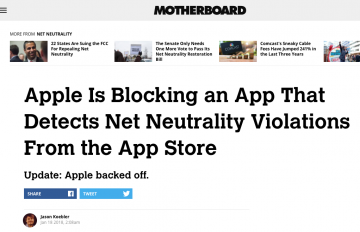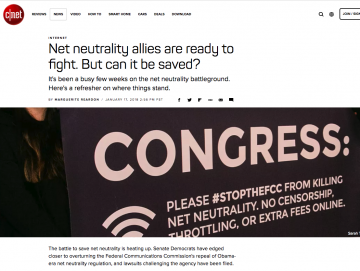David Choffnes, a researcher from Northeastern University, has created an app that detects net neutrality violations.
The app, called Wehe, is designed to test download speeds from seven apps: YouTube, Amazon, NBCSports, Netflix, Skype, Spotify, and Vimeo. Wehe uses your device to exchange traffic recorded from real, popular apps like YouTube and Spotify—effectively making it look as if you are using those apps. As a result, if an ISP tries to slow down a YouTube video, their app would see the same behaviour.
They then send the same app traffic, but replacing the content with randomized bytes , which prevents the ISPs from classifying the traffic. Our hypothesis is that the randomized traffic will not see application-specific shaping, but the original traffic will see it. They repeat these tests several times to rule out noise from bad network conditions, and tell you at the end whether your ISP is shaping your traffic.
According to Choffnes, net neutrality violations have been going on even before the rules changed. Data differentiation has been commonly used by cell phone providers. Choffnes’ research focuses on how and when throttling occurs:
- “What he’s found is that, for the most part, telecom providers aren’t throttling video; they are using a network management tactic known as deep packet inspection that throttles based on metadata associated with network traffic. What this means is that T-Mobile, for instance, might not try to detect whether something is a video or not, but it can detect whether a service calls its data a video or has the metadata hallmarks of a video. If so, it will set a download speed cap for that specific data”
An ISP will deliberately slow down traffic to certain websites, as was the case in the dispute between Comcast and Netflix. In a regulatory filing, Comcast accused Netflix of extortion. Netflix wants to be able to deliver its video traffic directly to Comcast’s network for free, but the cable giant (and some other large broadband providers) have been demanding fees from Netflix. If Netflix refuses to pay the fees, the quality of its videos plummets. The video site has accused the broadband providers of abusing their market power and harming Internet freedom by demanding “tolls” for the network connections (Source: https://www.theatlantic.com/politics/archive/2014/09/comcast-accuses-netflix-of-extortion/456813/).
Currently, Choffnes is under contract with a French telecom regulator to provide the app as a service. ARCEP, France’s version of the FCC, has cited his work and wants to use the methods to catch telecom companies violating net neutrality.
In related news, the FCC released its new regulations earlier this month. They suggest that “no-blocking and no-throttling rules are unnecessary to prevent the harms they were intended to thwart”. Instead, it is claimed that consumer backlash and market incentives will keep these ISPs in check. However, it appears to me that these rules are not only necessary, but require greater strength. ISPs have been operating in ways that give rise to consumer backlash (ex. AT&T blocking Facetime, but allowing it under a more expensive plan), and the FCC is now further enabling them to do so (Source: https://www.theatlantic.com/politics/archive/2014/09/comcast-accuses-netflix-of-extortion/456813/)
Sources:

